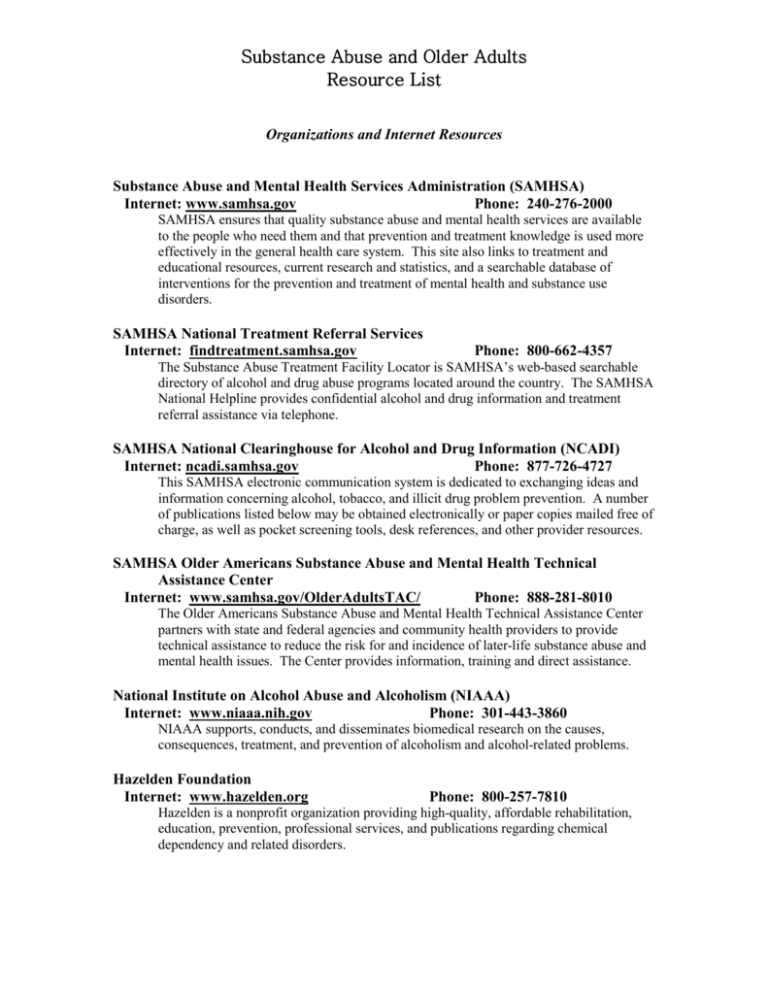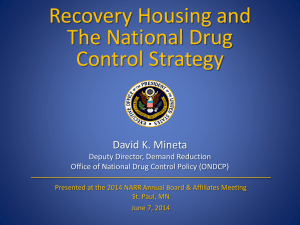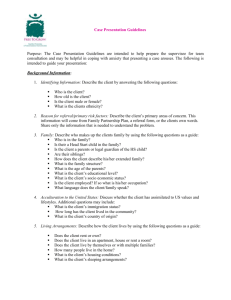Substance Abuse and Older Adults Resource List
advertisement

Substance Abuse and Older Adults Resource List Organizations and Internet Resources Substance Abuse and Mental Health Services Administration (SAMHSA) Internet: www.samhsa.gov Phone: 240-276-2000 SAMHSA ensures that quality substance abuse and mental health services are available to the people who need them and that prevention and treatment knowledge is used more effectively in the general health care system. This site also links to treatment and educational resources, current research and statistics, and a searchable database of interventions for the prevention and treatment of mental health and substance use disorders. SAMHSA National Treatment Referral Services Internet: findtreatment.samhsa.gov Phone: 800-662-4357 The Substance Abuse Treatment Facility Locator is SAMHSA’s web-based searchable directory of alcohol and drug abuse programs located around the country. The SAMHSA National Helpline provides confidential alcohol and drug information and treatment referral assistance via telephone. SAMHSA National Clearinghouse for Alcohol and Drug Information (NCADI) Internet: ncadi.samhsa.gov Phone: 877-726-4727 This SAMHSA electronic communication system is dedicated to exchanging ideas and information concerning alcohol, tobacco, and illicit drug problem prevention. A number of publications listed below may be obtained electronically or paper copies mailed free of charge, as well as pocket screening tools, desk references, and other provider resources. SAMHSA Older Americans Substance Abuse and Mental Health Technical Assistance Center Internet: www.samhsa.gov/OlderAdultsTAC/ Phone: 888-281-8010 The Older Americans Substance Abuse and Mental Health Technical Assistance Center partners with state and federal agencies and community health providers to provide technical assistance to reduce the risk for and incidence of later-life substance abuse and mental health issues. The Center provides information, training and direct assistance. National Institute on Alcohol Abuse and Alcoholism (NIAAA) Internet: www.niaaa.nih.gov Phone: 301-443-3860 NIAAA supports, conducts, and disseminates biomedical research on the causes, consequences, treatment, and prevention of alcoholism and alcohol-related problems. Hazelden Foundation Internet: www.hazelden.org Phone: 800-257-7810 Hazelden is a nonprofit organization providing high-quality, affordable rehabilitation, education, prevention, professional services, and publications regarding chemical dependency and related disorders. National Institute on Aging (NIA) Internet: www.nia.nih.gov Phone: 301-496-1752 The NIA is committed to improving the health of older people and supports, conducts, and disseminates research about the aging process, age-related diseases, and the special problems and needs of the aged. American Society on Aging (ASA) Internet: www.asaging.org Phone: 800-537-9728 ASA is a nonprofit organization committed to enhancing the knowledge and skills of people working with older adults and their families. ASA offers publications, resources, and a free web-based training program designed to educate about key issues related to alcohol and medication use, misuse and abuse in later life. Publications and Written Resources Blow, F.C. (Consensus Panel Chair) (1998). Substance Abuse Among Older Adults. Treatment Improvement Protocol (TIP) Series 26. Rockville, MD: Center for Substance Abuse Treatment, Substance Abuse and Mental Health Services Administration, U. S. Department of Health and Human Services. Available online: ncadi.samhsa.gov/govpubs/BKD250/ or order free at NCADI (above) This TIP presents treatment providers and other health care professionals with practical advice for identifying, screening, assessing, and treating substance abuse among people 60 and older. The TIP details how disorders typical in an aging person, such as dementia and delirium, can mask or mimic the effects of alcohol and prescription drug abuse. Elderly-specific screening and assessment instruments are included, along with adjustments to the DSM-IV criteria for substance abuse and dependence. Barry, K.L., Oslin, D., & Blow, F.C. (2001). Alcohol Problems in Older Adults: Prevention and Management. New York Springer Publishing Company. Hands-on text designed for use in a range of primary and mental health care settings. State-of-the-art, practical materials to detect, prevent, and intervene with older adults who are at-risk and problem drinkers. This manual includes guides to alcohol screening, protocols for managing withdrawal care and an English/Spanish Health Promotion Workbook for Older Adults. SAMHSA (2003). Get Connected! Toolkit: Linking Older Adults With Medication, Alcohol, and Mental Health Resources. SAMHSA, Rockville, Maryland. Available online: ncadistore.samhsa.gov/catalog/productDetails.aspx?ProductID=16523 or order free at NCADI (above) This kit is designed to enable older adult service providers to undertake health promotion, advance prevention messages and education, and provide screening and referral for mental health problems and the misuse of alcohol and medications. The kit includes a coordinator's guide and program support materials such as education curricula, fact sheets, handouts, forms, and resources. Bartels, S.J., Blow, F.C., Brockmann, L.M., & Van Citters, A.D. (2005). Substance Abuse and Mental Health Among Older Americans: The State of the Knowledge and Future Directions. Older American Substance Abuse and Mental Health Technical Assistance Center, SAMHSA, Rockville, Maryland. Available online: www.samhsa.gov/OlderAdultsTAC/SA_MH_%20AmongOlderAdultsfinal102105.pdf This report reviews prevalence of substance abuse and mental health problems among older adults and the impact on health and well-being for this population. This paper outlines currently available services, services needed, cost and reimbursement issues, and a rationale for prevention and early intervention. Blow, F.C., Bartels, S.J., Brockmann, L.M., & Van Citters, A.D. (2006). EvidenceBased Practices for Preventing Substance Abuse and Mental Health Problems in Older Adults. Older American Substance Abuse and Mental Health Technical Assistance Center, SAMHSA, Rockville, Maryland. Available online: www.samhsa.gov/OlderAdultsTAC/EBPLiteratureReviewFINAL.pdf This review highlights prevention and early intervention programs that have proven effectiveness. This report describes the current terminology of prevention programs and practices and provides a comprehensive review of the published evidence base for the prevention and early intervention of alcohol misuse, medication misuse, depression and anxiety, suicide, and co-occurring substance abuse and mental health problems among older adults. Blow, F.C., & Barry, K.L. (2002). Use and Misuse of Alcohol Among Older Women. Alcohol Research & Health, 26(4), 308-315. Available online: pubs.niaaa.nih.gov/publications/arh26-4/308-315.htm This article examines alcohol use among older women, related risk factors and beneficial effects, screening methods to detect alcohol problems in this population, and treatment and prevention approaches. Gurnack, A., Atkinson, R., & Osgood, N. (2002). Treating Alcohol and Drug Abuse in the Elderly. New York: Springer Publishing Company. The primary focus of the volume is on practical treatment. Case examples, included in each chapter, present client variables, the intervention process and "best practice" protocols. Various treatment approaches are described, including cognitive-behavioral, self-management, time-limited, and pharmacological. Tobacco and gambling addictions, which are often comorbid with alcohol and drug misuse, are also addressed. Colleran, C., & Jay, D. (2002). Aging and Addiction: Helping Older Adults Overcome Alcohol or Medication Dependence. Center City, Minnesota: Hazelden. This book provides a respectful, definitive guide for recognizing and addressing substance abuse among older adults. Key topics include: understanding the relationship between aging and addiction, finding help for a loved one, and recognizing the treatment needs of older adults. National Institute on Alcohol Abuse and Alcoholism. (1998). Alcohol and Aging – Alcohol Alert No. 40. Available online: pubs.niaaa.nih.gov/publications/aa40.htm This Alcohol Alert reviews research on the extent of alcohol consumption and associated problems among the elderly. Korper, S.P., & Council, C. L. (Eds.) (2002). Substance Use by Older Adults: Estimates of Future Impact on the Treatment System (DHHS Publication No. SMA 03-3763, Analytic Series A-21). Rockville, MD: Substance Abuse and Mental Health Services Administration, Office of Applied Studies. Available online: www.oas.samhsa.gov/aging/cov.htm or order free at NCADI (above) This report provides evidence concerning the projected demand for substance abuse treatment services for older Americans over the next 20 to 30 years. Substance Abuse and Mental Health Services Administration, Office of Applied Studies. (2006). Drug and Alcohol Services Information System Report: Older Adult Alcohol Admissions 2003. SAMHSA, Rockville, Maryland. Available online: www.oas.samhsa.gov/2k6/olderAdultsTX/olderAdultsTX.htm This report examines trends in admissions of adults aged 50 or older to publicly funded substance abuse treatment facilities, using data from the 2003 Treatment Episode Data Set. Substance Abuse and Mental Health Services Administration, Office of Applied Studies. (2005). National Survey on Drug Use and Health: Substance Use Among Older Adults 2002 and 2003 Update. SAMHSA, Rockville, Maryland. Available online: www.oas.samhsa.gov/2k5/olderadults/olderadults.htm This report contains research findings regarding prevalence of cigarette, alcohol and illicit drug use among older adults, reporting results from the 2002 and 2003 National Survey on Drug Use and Health (NSDUH). Substance Abuse and Mental Health Services Administration, Office of Applied Studies. (2005). Drug and Alcohol Services Information System Report: Older Adults in Substance Abuse Treatment 1995-2002 Trends. Available online: http://www.oas.samhsa.gov/2k5/olderAdultsTX/olderAdultsTX.htm This report examines trends in admissions of adults aged 55 or older to publicly funded substance abuse treatment facilities, using data reported to the Treatment Episode Data Set from 1995 to 2002. Beresford, T. & Gomberg, E. (1995). Alcohol and Aging. New York: Oxford University Press. Comprehensive text designed for clinicians dealing with diagnosis, treatment, related cognitive disorders, biology and biochemistry and special populations. Gurnack, A. (Ed.) (1997). Older Adults’ Misuse of Alcohol, Medicines, and Other Drugs: Research and Practice Issues. New York: Springer Publishing Company. A compendium of chapters written for the professional offering the latest thinking on alcohol and drug misuse in later life. This book deals with the epidemiology, diagnosis and treatment of alcoholism in older adults and includes articles on dementia, drug interactions and problems related to the nursing home setting. Kraft, M. (1990). Chemically Dependent Older Adults: How Do We Treat Them? Center City, Minnesota: Hazelden. This work focuses on treatment of the elder dependent person, providing an overall view of the treatment process.






